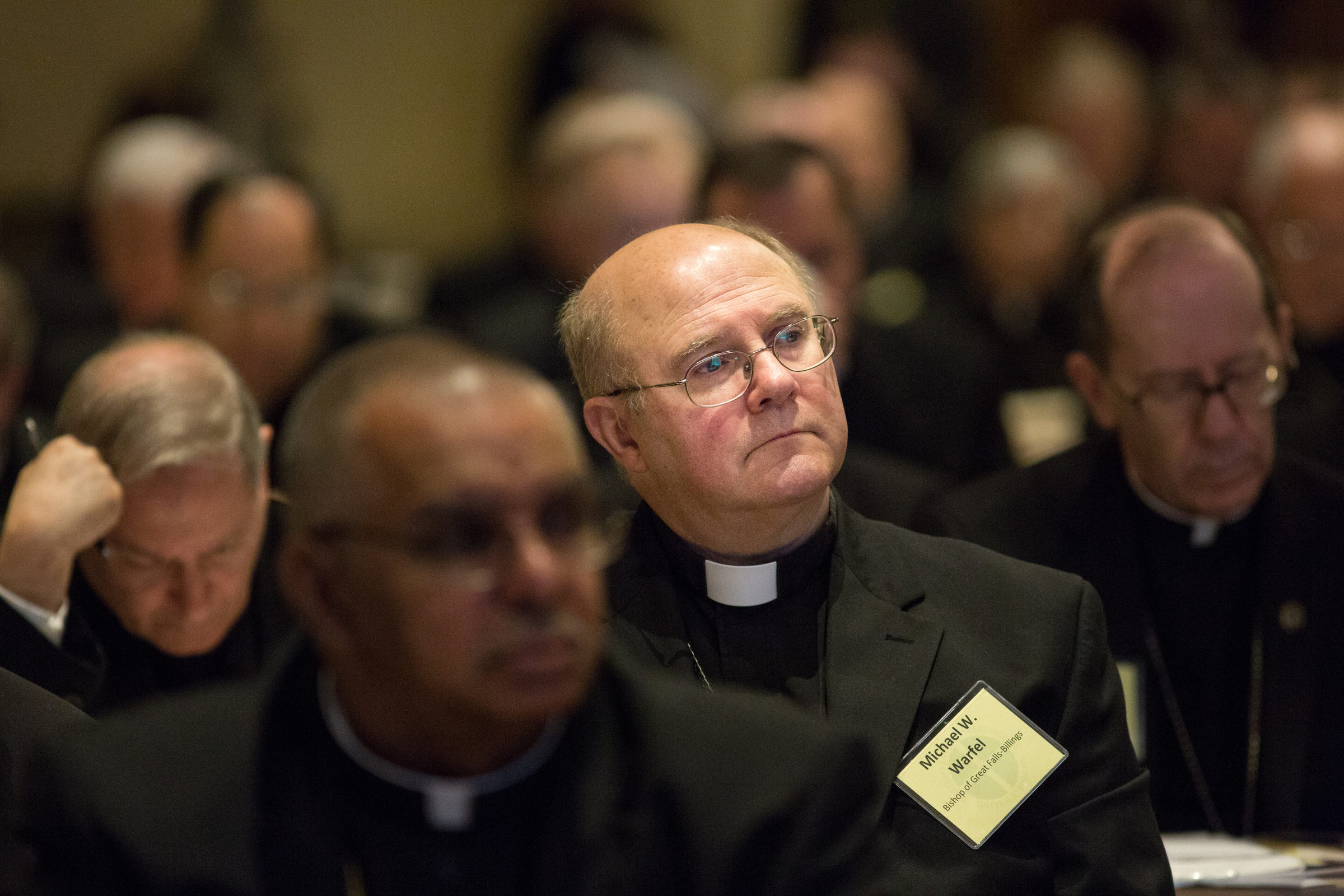
Bishop Michael Warfel of Great Falls-Billings, Mont., listens to speeches Wednesday during the annual spring general assembly of the U.S. Conference of Catholic Bishops in St. Louis. (CNS/St. Louis Review/Lisa Johnston)
Requiring all allegations of clergy sexual abuse to be reviewed by diocesan review boards and making mandatory parish audits should be priorities for bishops, according to the head of its National Review Board.
Francesco Cesareo, chair of the National Review Board established under the Dallas Charter, addressed a gathering here of more than 200 bishops Wednesday morning. Cesareo said the U.S. church has made great strides in combating the abuse issue but left open the door for continued improvement and vigilance.
The chair reviewed pieces of the board’s annual report, which found that 188 dioceses participated in the last audit. The Lincoln, Neb., diocese and five eparchies did not, but Cesareo noted that three of those eparchies have indicated they will participate this year. During the 2014 audit year, 37 allegations were made by current minors, with six of them found substantiated.
“This persistence of allegations begs some questions for your consideration. Is there a need to change the audit instrument? Is the audit effectively serving the purpose for which you originally intended? How can the audit more effectively ensure the charter is being implemented and children are being protected? What more can we learn from the audits?” Cesereo asked.
He said answering those questions could lead to a more effective audit.
“The audit is a critical instrument of accountability that signals to the faithful the commitment of the bishops in complying with the articles of the charter. It is imperative that we ensure the independence of the audit, so it is not perceived by the faithful as a tool that is controlled by the bishops,” Cesereo said.
Cesearo walked through eight recommendations for revisions to the charter.
- Update the preamble to reflect historical realities of the abuse crisis and the current situation;
- Strengthen the statement on episcopal commitment, particularly the concept of fraternal correction;
- Define the meaning of “open and transparent communication” as stated in Article 7;
- Address in the charter issues of boundary violations “because they can be a possible indicator of an individual’s potential for sexual abuse”;
- Require in the charter all allegations be brought to diocesan review boards to “eliminate the problems associated with having a gatekeeper decide which cases will or will not be reviewed by boards”;
- Address difficulties with ongoing supervision and monitoring of priests permanently removed from ministry but not laicized;
- Include a requirement for parish audits in the charter;
- Review the essential norms and consider whether they should be integrated into relevant articles in the charter and if they should be reviewed for revision themselves.
Cesaro told NCR that he believed addressing two of the recommendations -- reporting all allegations to diocesan review boards and requiring parish audits -- should be the first priorities for the bishops. He saw both as symptoms of “charter drift,” a concept the board addressed in its annual report.
“I think the charter drift is not an intentional drift,” he said. “I think it occurs because there’s this sense that we have all these policies and procedures in place, and so sometimes we’re not as diligent in making sure those policies and procedures are actually being followed and implemented.”
Cesareo said he had yet to see the Vatican policy regarding bishop accountability and could not comment. He told the bishops that it was important they address what the phrase “fraternal correction” means in practical terms and how it is exercised in a case of a failure to implement the charter.
Archbishop Joseph Kurtz, president of the bishops’ conference, said during the mid-morning press conference that he, too, did not have a lot of background on the new Vatican policy. “We welcome and will cooperate” with the Vatican, he said.
“We’ve had a long track record in wanting to provide fraternal support and help to brother bishops in being both transparent and really embracing and living out all the areas of the charter in the particular life of the church,” he said.
Asked how recent developments -- the resignation of Bishop Robert Finn from the Kansas City-St. Joseph, Mo., diocese and criminal charges brought against the St. Paul-Minneapolis archdiocese -- reflect how the U.S. church is responding to the abuse issue, Kurtz said the examples highlighted the importance for dioceses to work in communion with local law enforcement officials.
“I think in many ways, if an issue comes up in civil law -- and this could be true for any potential violation -- the response of the church needs to be, first of all, to cooperate with proper civil authorities,” Kurtz said.
[Brian Roewe is an NCR staff writer. His email address is broewe@ncronline.org. Follow him on Twitter: @BrianRoewe.]
